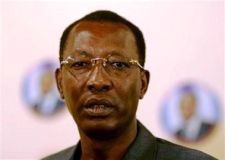Chad says Sudan attacks to export fundamentalism
April 18, 2006 (N’DJAMENA) — Chad President Idriss Deby said on Tuesday Sudan had attacked his country in a drive to export Khartoum’s fundamentalist system to sub-Saharan Africa.
 Rebels fighting to end Deby’s rule over the landlocked central African oil producer attacked the capital last week and have vowed to disrupt a presidential poll on May 3 in which Deby is standing for a third term after nearly 16 years in power.
Rebels fighting to end Deby’s rule over the landlocked central African oil producer attacked the capital last week and have vowed to disrupt a presidential poll on May 3 in which Deby is standing for a third term after nearly 16 years in power.
“If there is no election on May 3 … there will be a constitutional void and one cannot rule out a generalised civil war promoted by the Khartoum regime (Sudan),” Deby told Reuters in an interview.
Deby accuses Sudan of promoting and arming rebels who raced in pick-up trucks from the east to raid N’Djamena on Thursday but were driven off in fighting that killed and wounded several hundred people.
“Sudan has attacked Chad up to the very gates of N’Djamena. What do you call that if it isn’t war,” Deby said. “If we’re attacked tomorrow, we’ll respond. We don’t want war, but we’ll defend ourselves.”
Deby said Sudan’s Arab government was trying to export its “fundamentalist system” to the rest of sub-Saharan Africa.
“Chad is a bridge. If that bridge gives way to Khartoum then the whole of sub-Saharan Africa runs the risk of being destabilised,” he said.
“It’ll be worse than Ivory Coast or the Balkans,” he said referring to other territories split by war.
Sudan denies helping the rebels, whom Chad says use the conflict-torn Sudanese Darfur region as a base. But most observers say Khartoum backs the rebel United Front for Democratic Change.
Chad has presented prisoners and military equipment captured in Thursday’s fighting which it says proves Sudan’s involvement. A joint United Nations/African Union team would be allowed to inspect them in the coming days, Deby said.
He repeated his call for the international community to guarantee security in Darfur, where fighting between pro-Khartoum Arab militias and non-Arab tribes has killed tens of thousands and displaced around 2 million people since 2003.
“We ask not just for U.N. intervention, but military intervention by the international community,” he said.
NO OIL COMPROMISE
The Chadian president also ruled out his government making any compromise in a dispute with the World Bank over oil revenues. Chad has threatened to halt oil production unless the bank releases frozen Chadian oil royalties by the end of April.
Asked whether he was ready to compromise, he replied: “No”.
“I say no because Chad is not the only oil producing country in the world or Africa, so why do they want special treatment for Chad and yet say nothing to other oil producers?” Deby said.
Oil hit a record $72.20 a barrel on Tuesday as Iran defied world pressure to halt its nuclear programme, raising new fears of a cut in supplies from the world’s fourth biggest crude exporter.
On Monday, Deby’s government pushed back a deadline for shutting off oil output from midday on Tuesday to the end of this month after what Chad said was a U.S. offer to mediate in the dispute with the World Bank.
Chad is demanding that the World Bank unblock payment of production royalties frozen for several months or that an Exxon Mobil
The World Bank froze oil profits saved in a London escrow account because it said Chad breached an agreement when it changed an oil revenue law in December to access funds that were meant to be saved for future generations.
Bank President Paul Wolfowitz suspended some $125 million in loans to Chad in January.
“The United States is going to get involved in the negotiations to ask the World Bank to reverse its decision. If by April 30, the World Bank has not let go, we’re going to shut off the (oil) taps,” Deby said.
U.S. officials have shied away from talking about mediation, instead saying Washington would act as an “honest broker” to try to foster better understanding between Chad and the World Bank.
Diplomats say U.S. Deputy Assistant Secretary of State for African Affairs, Donald Yamamoto, is expected in Chad early next week for talks.
The bank had pressed Chad to pass the original oil revenue law in exchange for funding a $3.7 billion pipeline carrying crude to the Gulf of Guinea for export. It was touted as a test case for oil revenue management in Africa.
The pipeline, which produces 160,000-170,000 barrels per day, is operated by U.S. oil majors Exxon Mobil
(Reuters)
